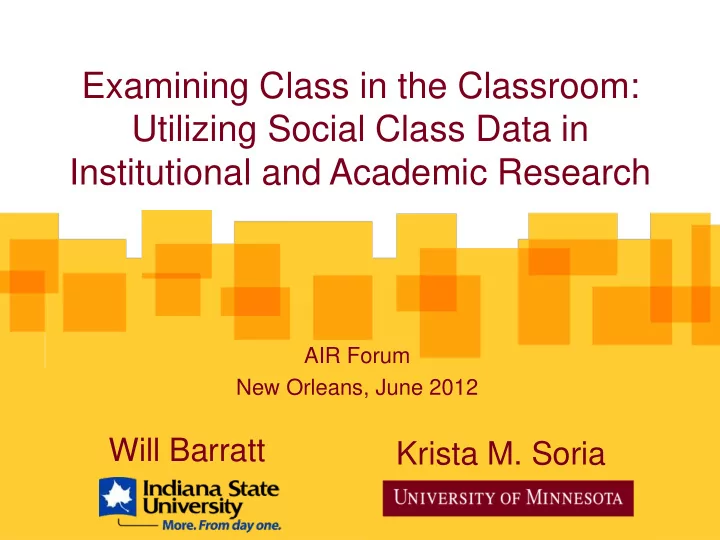

Examining Class in the Classroom: Utilizing Social Class Data in Institutional and Academic Research AIR Forum New Orleans, June 2012 Will Barratt Krista M. Soria
What is Social Class? • Social category that shapes identity • Complex multi-dimensional factor inclusive of o SES o parents' educational attainment o occupational prestige o socio-cultural elements
Why Social Class Matters • Students from lower social class backgrounds are less likely to persist, graduate from college, and attend graduate school • While many surveys gather data on some of the variables comprising social class, few actually collect the holistic variable of social class
Research Questions • What are the advantages and disadvantages of using social class indicators in institutional and educational research? • Are students credible in self-identifying social class? • Do different social class indicators have different effects on student outcomes?
Research Question One What are the advantages and disadvantages of using social class indicators in institutional and educational research?
Class Measurement Challenges: • No single definition or categorization of class is universally utilized • Variety of conceptual theories and frames are used in class research • Cultural differences challenge the validation of instruments • Class consciousness and salience can vary in specific contexts and change over the lifespan
Class measurement Conflation of terminology: SES & social class • SES o parental income o parental education o parental occupation • Social class o includes a cultural component; many researchers have noted the "culture shock" associated with college attendance
Challenges to Class Measurement • Parental occupational prestige – Titles can be relatively meaningless; women may have high prestige positions but lower incomes; no indication of wealth or capital • Parental wealth and income – FAFSA data sometimes missing; self-reported • Parental education – Different criteria are used; missing data • Social and cultural capital
Research Question Two Are students credible in self-identifying social class?
Conceptual Framework • Social identity: an individual's knowledge that he or she belongs to a social group • Social identity is clarified through comparison with others in ingroups and outgroups • Social class identity interacts with other identities
Subjective Self-identification of Class • "how the person believes and feels about things" and the "person's style of life" is more important than objective measures of social class (Jackman & Jackman, 1983)
Subjective Self-identification of Class • Factors influencing self-identification in social class: o social status of group o clarity and permeability of class boundaries o perceived similarity to prototypical group member o (several strategies to avoid stigmatization: heterogeneity and denigration of the superior group)
Methods SERU survey: • single institution: 35% response rate in 2010 • 12 institutions: average 34.7% response rate in 2010 Measures • social class • parental education • family income • ACT/GPA • sense of belonging
Results: Income & Class
Results: Income & Class
Results: Income & Class
Results: Income & Class
Results: Parental Education & Class
Results: Parental Education & Class
Results: Demographics & Class
Results: Demographics & Class
Research Question Three Does social class impact student outcomes?
Results: Academics & Class
Results: Academics & Class
Results: Sense of Belonging & Class
Discussion • Social class matters in educational and institutional research. • Several challenges are present in social class identification. • Students appear to be relatively credible in their social class identification.
Recommendations Consider including social class within institutional or educational measures. Further testing of students' credibility could be achieved through interviews and follow- up surveys.
Questions? • Krista Soria, ksoria@umn.edu • Will Barratt, Will.Barratt@indstate.edu
Recommend
More recommend